Introduction
In a world where financial integrity is paramount, understanding the intricacies of financial audits becomes essential for organizations striving for transparency and compliance. A financial audit serves as a pivotal tool that not only validates the accuracy of financial statements but also enhances stakeholder confidence and mitigates risks. With regulations tightening and the financial landscape becoming increasingly complex, the benefits of thorough audits extend far beyond compliance; they foster operational efficiency, informed decision-making, and strategic growth.
From uncovering potential discrepancies to leveraging advanced technologies like Big Data, financial audits play a transformative role across various sectors. This article delves into the essentials of financial audits, exploring their purpose, types, processes, and the myriad benefits they offer, equipping organizations with the knowledge needed to navigate today’s dynamic business environment effectively.
What Is a Financial Audit?
A monetary examination functions as an essential tool for guaranteeing clarity and precision in the fiscal reports of any organization, regardless of its profit orientation. This independent examination assesses the integrity of monetary information, thereby bolstering stakeholder confidence. A well-executed examination offers a credible assessment of the dependability of monetary reports, which is essential for adhering to relevant laws and regulations.
The significance of a monetary audit extends beyond mere compliance. It acts as a validating force, especially when organizations seek external funding or partnerships. For instance, presenting audited fiscal statements can significantly enhance a company's credibility with potential investors. As noted by industry experts, having financial records validated by a reputable accounting firm is often a prerequisite for attracting investment, whether for equity or bond sales.
Furthermore, the importance of evaluations in today's data-focused environment cannot be overstated. The BFSI sector, particularly, has begun to leverage Big Data technologies to refine auditing processes and enhance decision-making. With regulatory compliance becoming increasingly stringent, organizations are recognizing the necessity of strong review practices to mitigate risks and ensure operational efficiency. As the Federal Deposit Insurance Corporation (FDIC) has indicated, evolving standards in governance and risk management are compelling institutions to invest in comprehensive training and resources for their review committees.
In essence, a monetary review not only confirms the precision of accounting documents but also strengthens the organization's overall governance structure, allowing it to manage the complexities of today's business landscape efficiently.
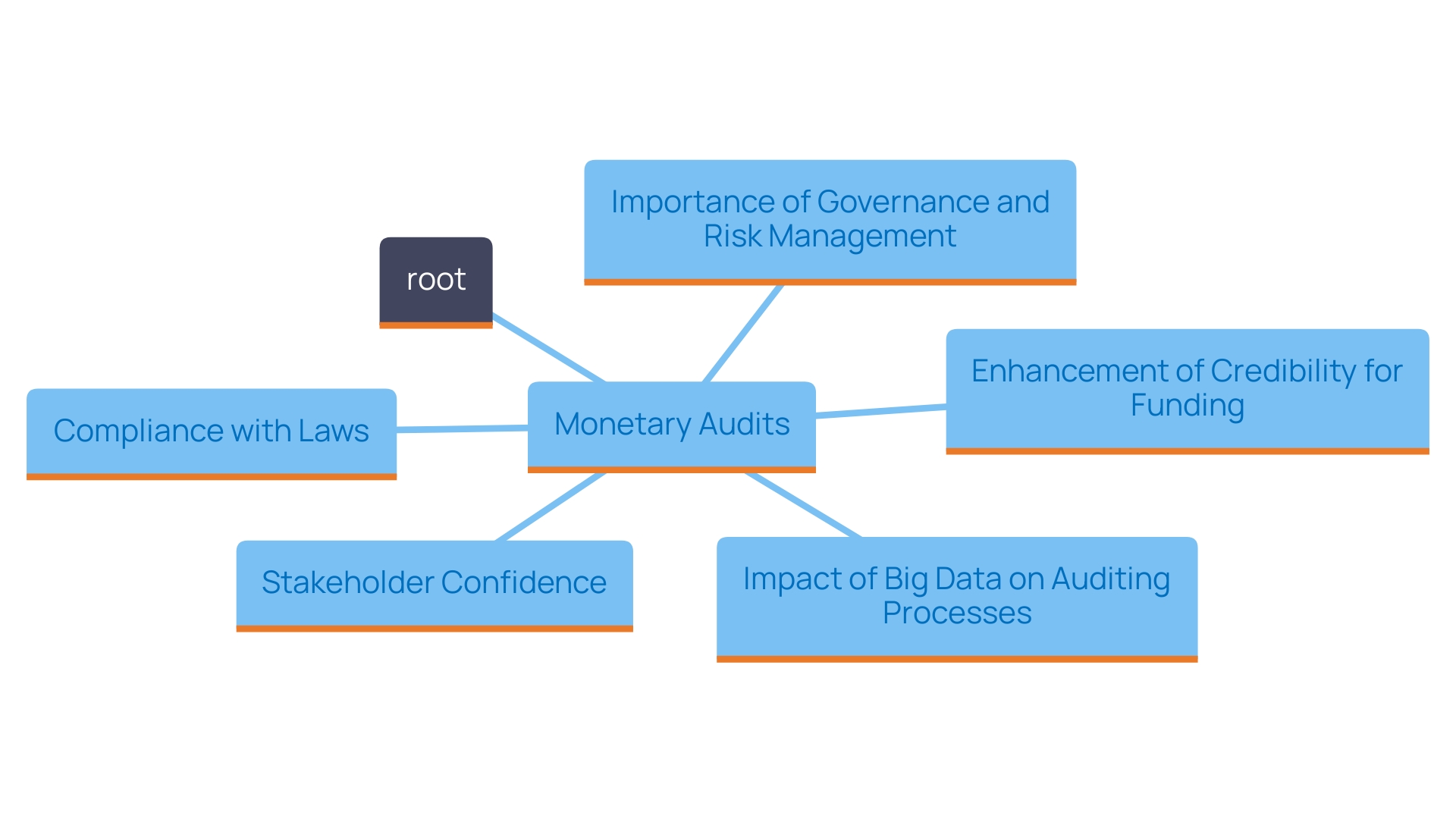
Purpose of Financial Audits
Monetary evaluations serve an essential purpose in upholding the accuracy of fiscal reporting and promoting confidence among stakeholders. They provide confidence about the trustworthiness of monetary statements, which is crucial for informed decision-making by investors, creditors, and regulatory bodies. By systematically examining financial records and transactions, evaluations help to identify discrepancies, detect potential fraud, and enhance the accuracy of financial reporting.
Moreover, adherence to laws and regulations is a fundamental aspect of evaluations. Regulatory bodies impose strict guidelines to ensure that organizations operate transparently and ethically. A strong review process ensures adherence to these regulations, thereby mitigating the risk of legal repercussions and enhancing the organization’s reputation.
Statistics indicate a growing reliance on innovative technologies within the audit process, particularly in the Banking, Financial Services, and Insurance (BFSI) sector. The adoption of Big Data technologies has significantly improved decision-making, risk management, and operational efficiency. 'Based on recent reports, North America is anticipated to lead the analytics market, propelled by strict regulatory adherence and advancements in digital tools.'.
Furthermore, the significance of predictive analytics is increasing, enabling organizations to analyze monetary data to anticipate future results effectively. This capability is pivotal in navigating the complexities of today’s economic landscape, as it empowers decision-makers to respond proactively to emerging challenges. Consequently, a comprehensive review of finances not only protects adherence to regulations and precision but also enables organizations to utilize analytics for strategic expansion.
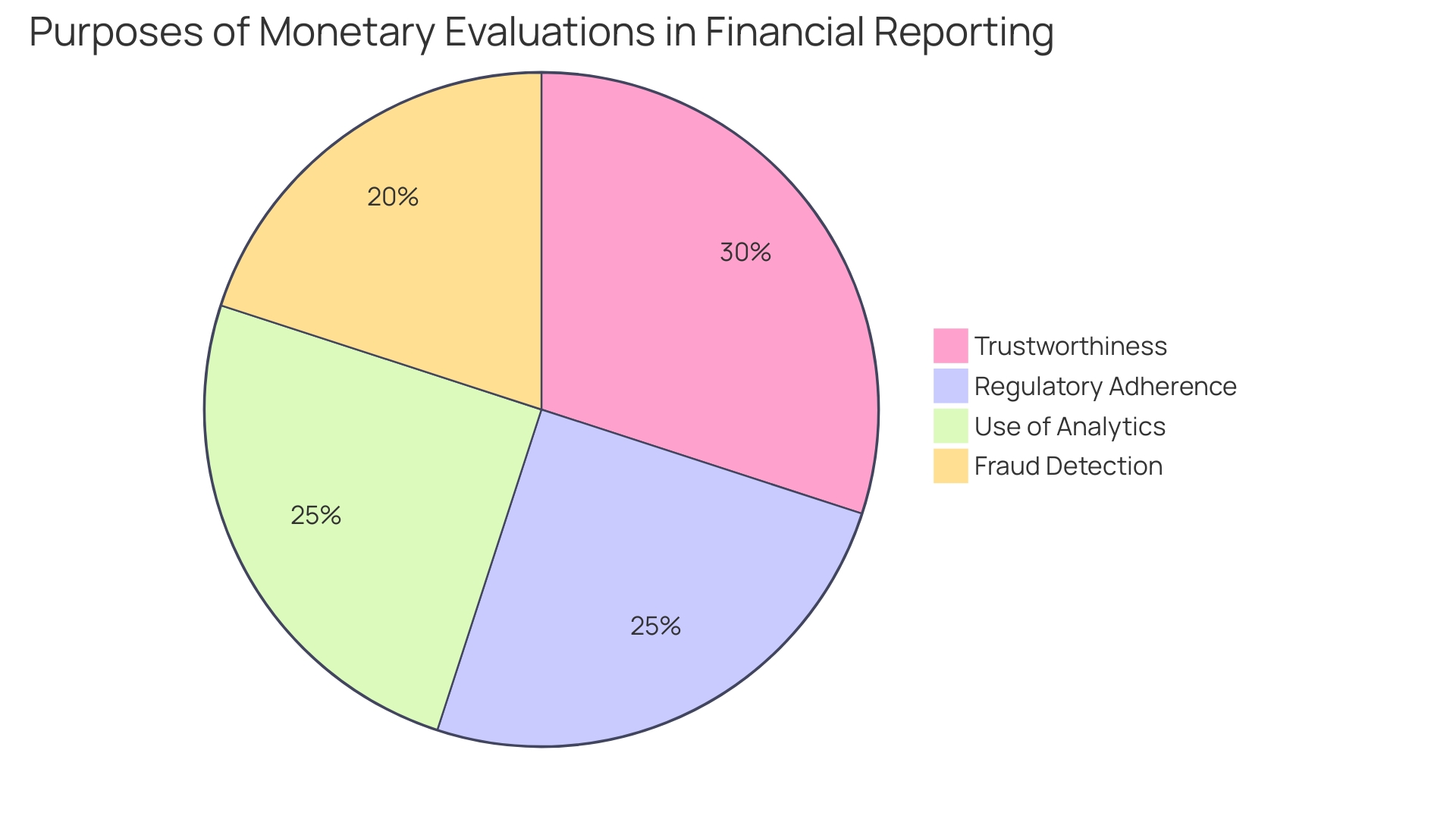
Types of Financial Audits
Monetary evaluations take on multiple types, with each fulfilling unique roles that address various elements of an organization's fiscal integrity and adherence to regulations.
-
External Audits: Conducted by independent auditors, these audits provide an unbiased evaluation of a company's monetary reports. 'Their primary objective is to ensure the accuracy and reliability of monetary reporting, which is crucial for stakeholders and regulatory bodies.'. As noted, "The idea is to make sure everything is accurate. Accounting books and financial statements get looked at by either external auditors or internal auditors."
-
Internal Reviews: These evaluations occur within the organization and are usually conducted by internal personnel. Their focus is on evaluating the effectiveness of internal controls, compliance with policies, and operational efficiency. Internal evaluations not only assist in recognizing potential risks but also promote ongoing enhancement in processes. According to industry insights, "Like the name suggests, an internal review takes place inside your business.". They examine financial reports, policy adherence, and operational issues
-
Compliance Evaluations: These evaluations assess an organization's adherence to laws, regulations, and internal policies. With growing regulatory oversight, adherence evaluations have become crucial in reducing risks linked to non-adherence, which can lead to significant penalties. Keeping abreast of compliance requirements is vital, especially as new regulations emerge, such as those related to cybersecurity and cryptocurrency.
-
Forensic Examinations: These specialized assessments are carried out to investigate possible fraud or monetary misconduct. Forensic auditors utilize various techniques to uncover discrepancies and gather evidence that may be used in legal proceedings. Their work is essential in protecting assets and upholding the integrity of records, as emphasized by the increasing attention on emerging risks in the economic landscape.
In summary, grasping the various kinds of financial examinations is crucial for organizations to uphold transparency, guarantee adherence, and protect against financial wrongdoing.
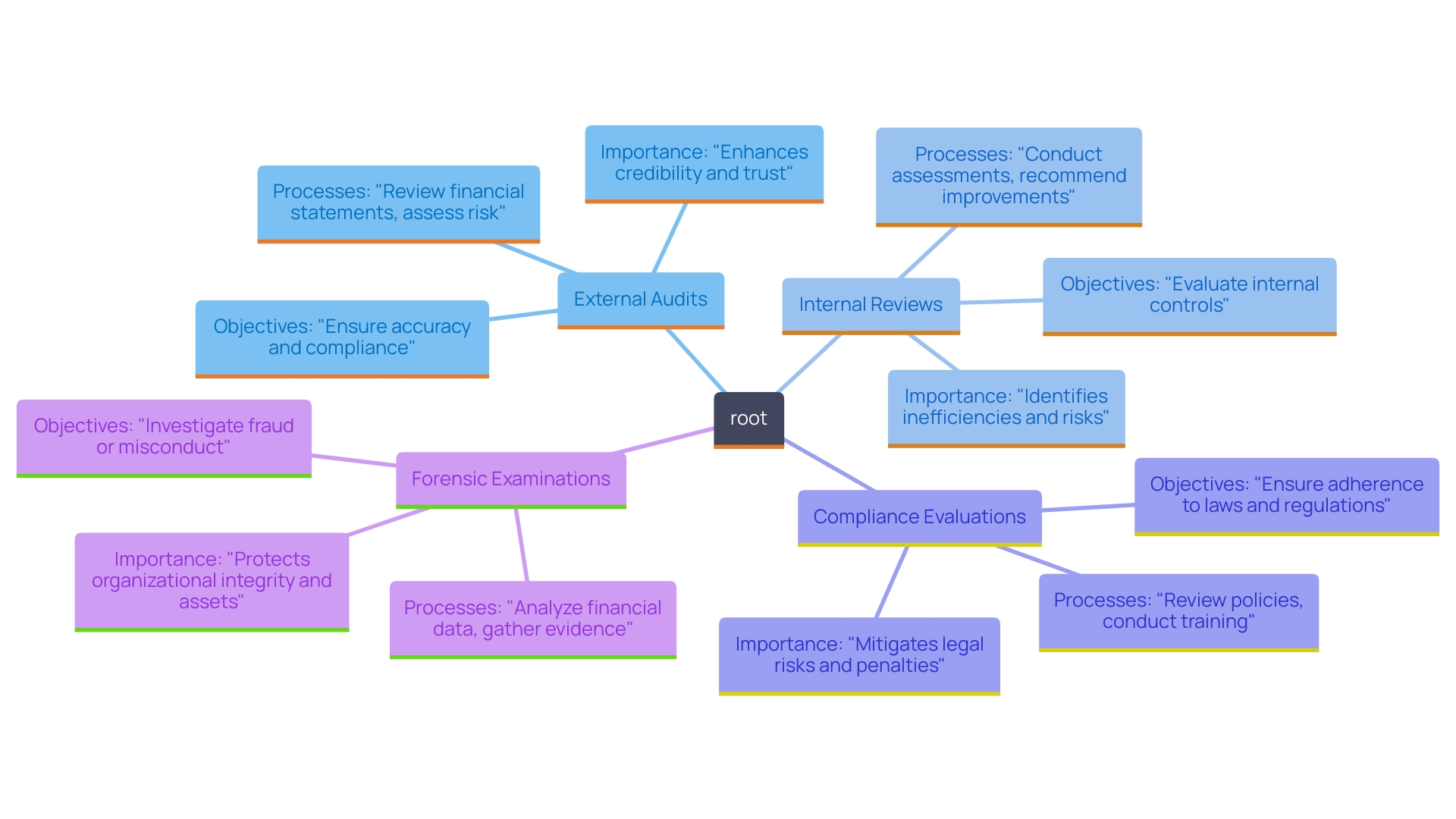
The Audit Process: Phases and Procedures
The evaluation process is a structured and multifaceted undertaking that typically encompasses three essential phases: planning, fieldwork, and reporting.
-
Planning Phase: This initial stage is critical for establishing a solid foundation for the review. Auditors engage in thorough discussions with management to gain insight into the entity's operations, internal controls, and potential risks. This understanding assists in tailoring the audit approach to meet specific needs. Efficient planning also includes identifying the relevant accounting standards, such as Generally Accepted Accounting Principles (GAAP), which direct the creation of reports. A well-defined timeline and clear objectives are established during this phase, ensuring all parties are aligned.
-
Fieldwork Phase: The fieldwork phase is where the auditors gather and examine monetary data. This involves on-site visits to the entity's premises to examine records and operations closely. Auditors may examine a range of records, from monetary reports to transaction specifics, ensuring that everything adheres to the established accounting framework. This phase is essential for identifying discrepancies or irregularities that could indicate deeper issues. As part of this process, auditors may conduct interviews with key personnel and utilize analytical procedures to validate the information gathered.
-
Reporting Phase: The culmination of the examination process occurs during the reporting phase, where auditors compile their findings into a comprehensive report. 'This document not only presents the auditors' views on the fiscal reports but also emphasizes any major concerns faced during the examination.'. The report serves as a vital communication tool for stakeholders, providing assurance regarding the reliability of the financial statements and compliance with relevant regulations.
Recent advancements in auditing standards, such as the introduction of the International Standard on Auditing for Audits of Financial Statements of Less Complex Entities (ISA for LCE), emphasize the significance of modifying examination processes to address the distinct requirements of various entities. This new standard reflects an evolving landscape in examination practices, particularly for small and medium-sized businesses, ensuring that evaluations are both effective and efficient.
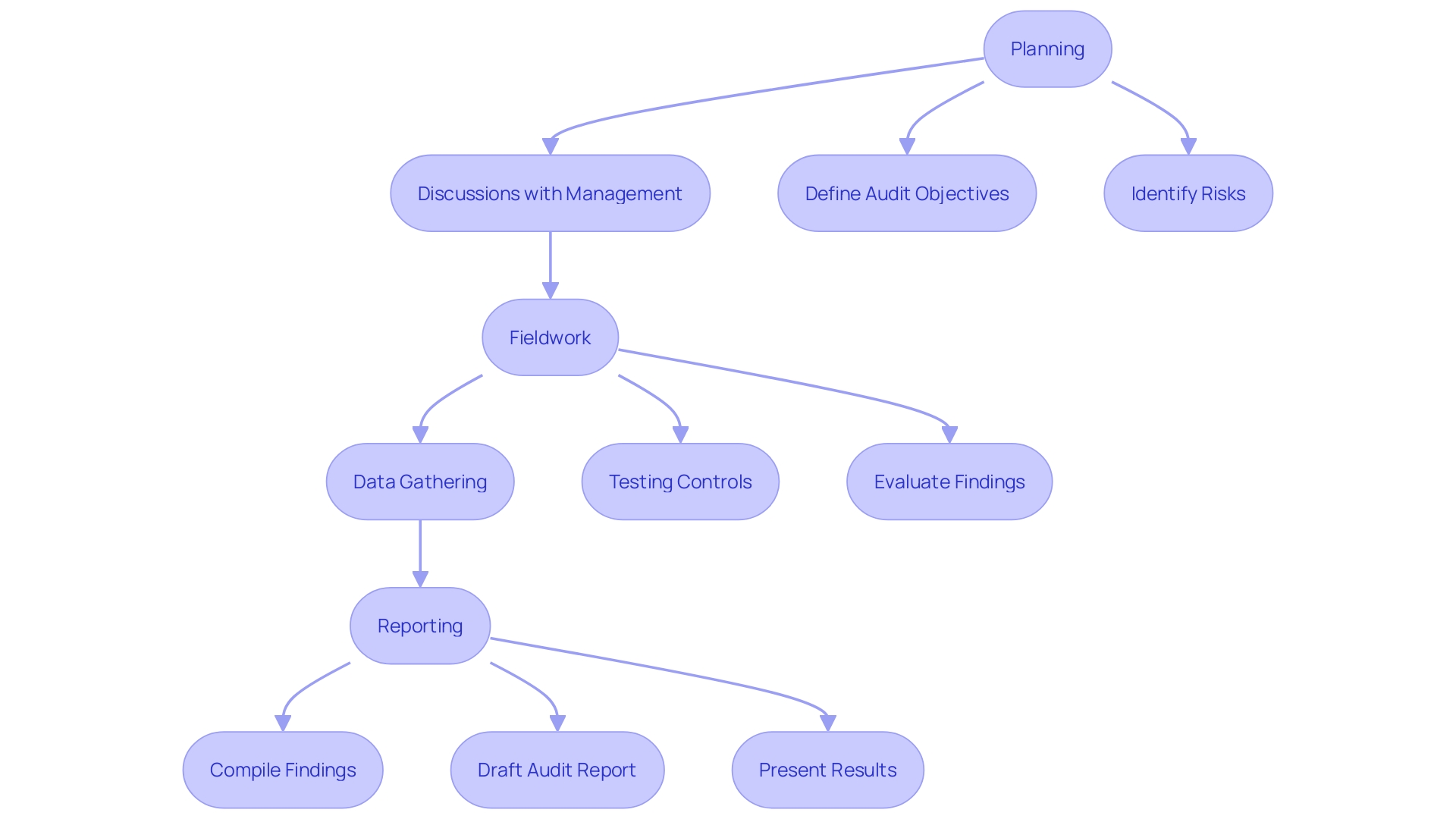
Benefits of Financial Audits
Financial audits are essential for organizations, offering a plethora of benefits that significantly enhance operational effectiveness and stakeholder trust. One of the main benefits is enhanced economic transparency, which fosters credibility with stakeholders. This transparency is not just about showing numbers; it involves presenting a clear narrative of economic health, which is crucial for attracting investors and maintaining customer confidence.
Moreover, monetary evaluations assist in recognizing operational shortcomings that might otherwise remain undetected. By scrutinizing financial statements and operational processes, organizations can pinpoint areas needing improvement. For instance, a recent analysis highlighted how businesses adopting internal evaluations were able to streamline their operations, leading to a notable increase in productivity and cost savings.
Effective risk management is another critical advantage of regular evaluations. By assessing financial practices and adherence to regulations, evaluations assist organizations in reducing risks linked to financial misreporting or operational failures. For instance, the International Auditing and Assurance Standards Board (IAASB) recently introduced a new standard tailored for smaller entities, emphasizing the need for proportionate and focused examination practices that enhance risk management capabilities.
Furthermore, evaluations promote informed decision-making. A thorough examination of economic performance—analyzing income statements, balance sheets, and cash flow—enables organizations to assess whether they are meeting their monetary goals. This data-driven approach supports strategic planning and resource allocation, ultimately contributing to long-term success.
In a changing economic environment, where predictive analytics is becoming more significant, the insights obtained from monetary reviews can enable organizations to adjust rapidly to shifts in market circumstances and regulatory demands. As the monetary services sector progressively adopts Big Data technologies, the function of evaluations in improving decision-making and operational efficiency becomes even more significant.
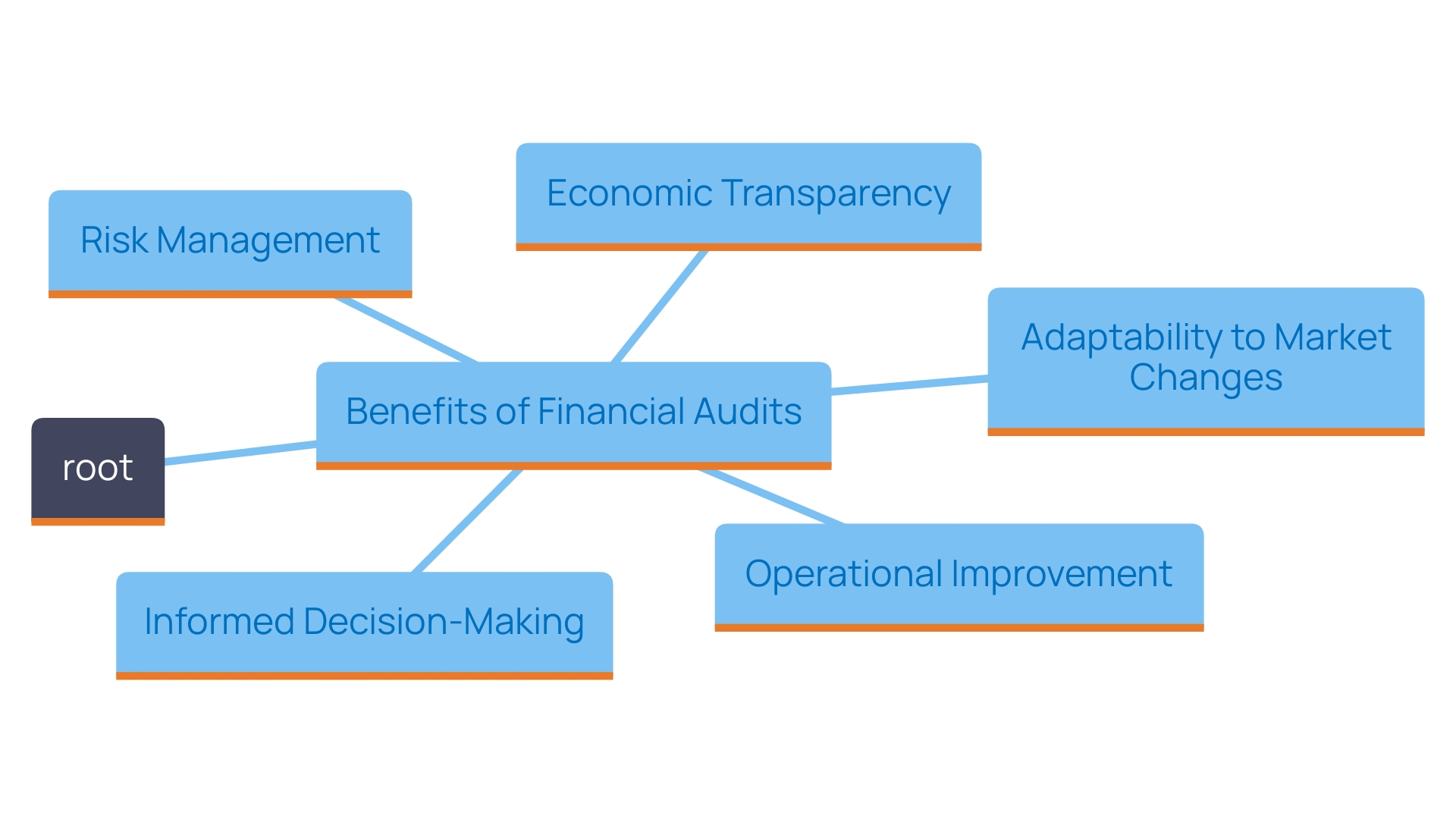
Preparing for a Financial Audit
'Preparation for a monetary audit is critical and entails a series of structured steps designed to facilitate a smooth and effective audit process.'. Initially, it is crucial to collect all required monetary documents, which consist of accounts reports, bank reconciliations, and transaction details. Ensuring adherence to accounting standards, particularly the Generally Accepted Accounting Principles (GAAP), is paramount. This involves reviewing your monetary statements to confirm that they are presented accurately and transparently, in accordance with the required accounting framework.
Conducting a pre-audit assessment can further streamline the process. This assessment should involve analyzing potential areas of concern that auditors may focus on, such as discrepancies in financial reporting or compliance issues. By identifying these areas ahead of time, you can address them proactively, reducing the likelihood of surprises during the review.
Effective interaction with the evaluation team is also a cornerstone of successful preparation. Establishing clear lines of communication allows for the timely exchange of information and clarifications. This not only enhances the quality of the audit but also fosters a collaborative environment, making the audit process more efficient.
Comprehending your reporting requirements and setting a schedule for deliverables is essential. Factors such as deadlines for financial reporting and the basis of accounting required for your financial statements must be clearly defined. This information is typically outlined in governing documents like operating agreements or loan agreements, and it is vital for aligning your preparation efforts with the expectations of stakeholders.
In summary, comprehensive preparation paired with a clear understanding of the audit process will significantly contribute to an efficient and effective audit outcome.
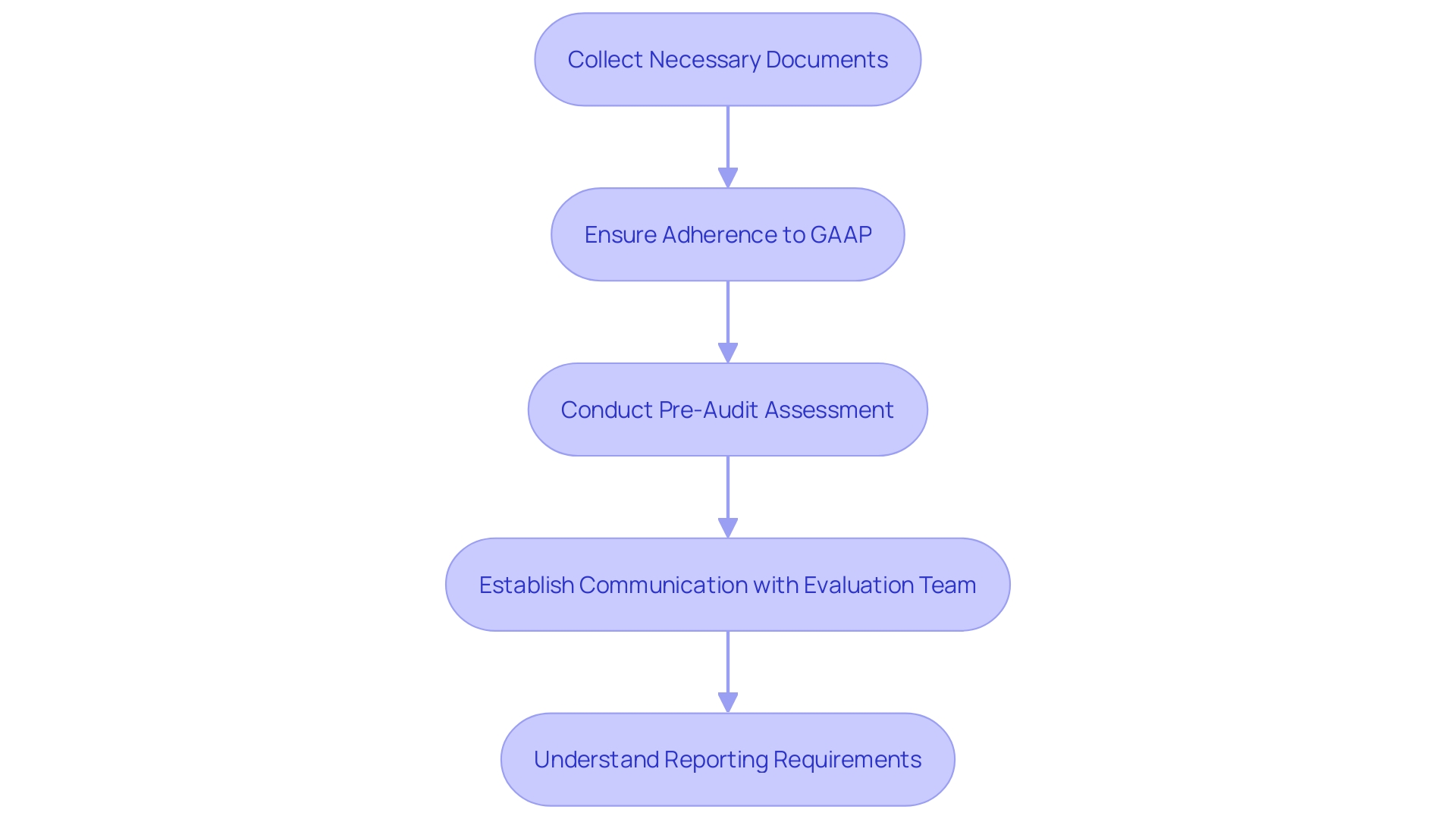
Conclusion
Financial audits emerge as a cornerstone of organizational integrity, ensuring transparency and accuracy in financial reporting. By validating the reliability of financial statements, audits not only bolster stakeholder confidence but also play a critical role in attracting investment and fostering partnerships. The evolving landscape of regulatory compliance necessitates that organizations adopt robust audit practices, particularly as the integration of technologies like Big Data enhances decision-making and operational efficiency.
The various types of financial audits—external, internal, compliance, and forensic—each serve unique purposes that cater to the diverse needs of organizations. Understanding these distinctions is vital for maintaining transparency, ensuring compliance, and safeguarding against financial misconduct. As organizations navigate the complexities of today's business environment, a well-structured audit process encompassing planning, fieldwork, and reporting becomes essential for achieving comprehensive insights into financial health.
The myriad benefits of financial audits extend beyond compliance; they enhance operational effectiveness by identifying inefficiencies, promoting informed decision-making, and improving risk management. By preparing thoroughly for an audit—gathering necessary records, conducting pre-assessments, and fostering effective communication—organizations can ensure a smooth audit process and achieve favorable outcomes. Embracing these practices positions organizations not only to meet current regulatory demands but also to thrive in a rapidly changing financial landscape.




